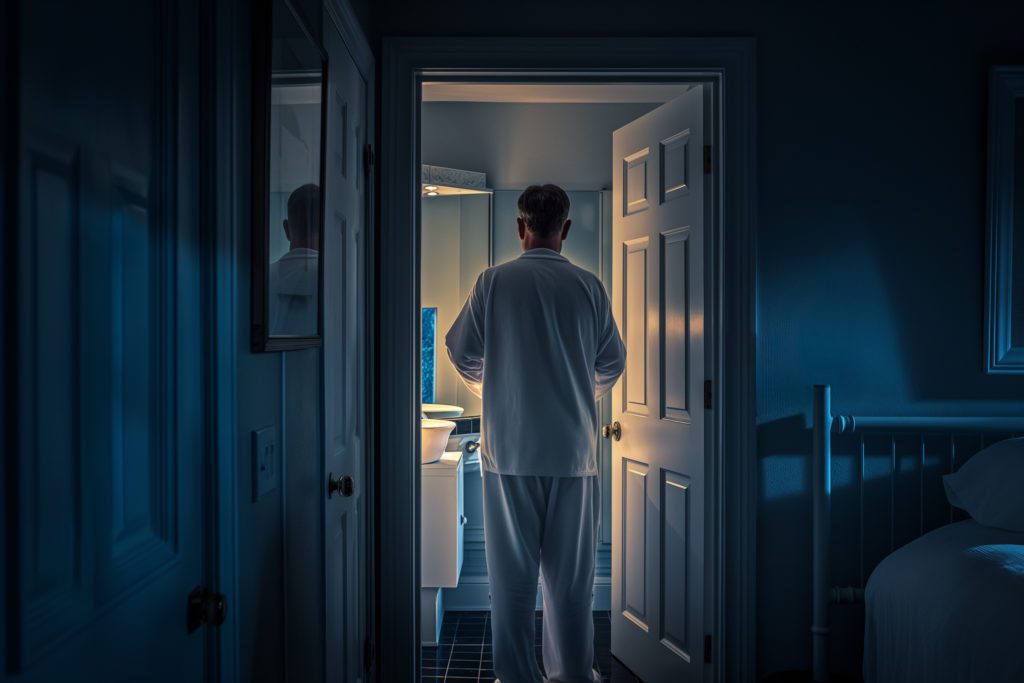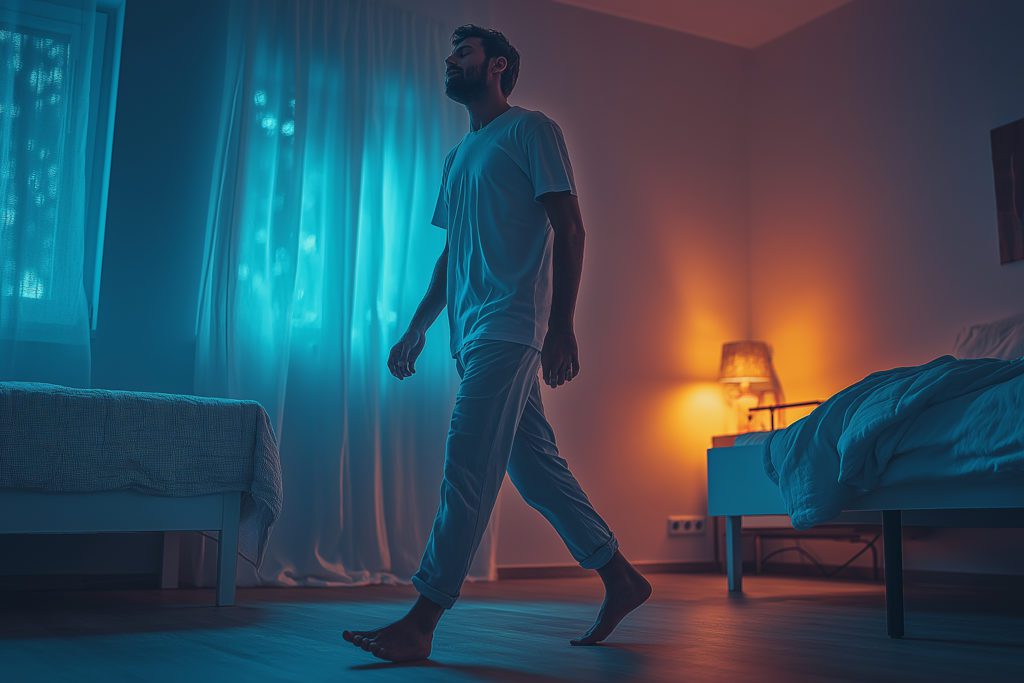
The Science Behind Fever-Induced Sleep Disturbances
While fevers are an important part of your immune system, their sleep disturbances may do more harm than good. Explore how fevers can affect sleep.

Have you ever been sick with a fever and had incredibly vivid dreams? This phenomenon, known as fever dreams, is one of the most common fever-induced sleep disturbances. Since fever dreams can often be unpleasant and disturbing, they may cause you to wake up during the night instead of getting an uninterrupted night of sleep—a detriment to your healing process.
In addition to fever dreams, fevers can also affect your sleep by making you too hot or cold to fall asleep. With sleep crucial for your immune system, this can cause fevers to have the opposite effect they should when it comes to your recovery.
What Happens When You Have A Fever?
Before getting into how fevers can interrupt your sleep, let’s first explore what happens to your body when you have a fever.
A fever is generally considered an elevation in your body temperature—typically anything above 100.4 degrees. But what happens underneath your skin to cause this rise?
An infection is often what sets off fevers. Your immune cells detect foreign invaders, such as viruses or bacteria, and release pyrogens. These fever-inducing chemicals travel to the brain, where they tell the temperature-sensitive neurons in your brain that they need to raise your body temperature.
In response to this signal, your neurons then release prostaglandins, which are inflammatory chemicals that increase the heat in your body, initiating a fever. They accomplish this by causing blood vessels to constrict, reducing the amount of heat dissipated through the surface of the skin. Your brain may also cause you to shiver, which is another way your body can generate heat.
We often think of a fever as something bad that should be immediately brought down, but a fever is our body’s way of fighting off whatever pathogen is invading you. So, a fever is a good thing; it means your immune system is working.
A higher temperature can create an environment in which the virus and bacteria cannot survive. It may also make your immune system more effective as it produces heat shock proteins that activate various immune pathways.
Still, while a fever means that our body is fighting infection, it can have other repercussions, including some that affect our sleep.
Fever Dreams: How Body Temperature Affects the Brain
A fever dream, as the name suggests, is a dream that occurs when your body temperature is higher than normal. Most people describe fever dreams as disturbing, with one study reporting that 94% of the participants described their fever dreams negatively.
In many cases, those who have fever dreams describe them as being emotionally troubling, intense, scary, or strange. Fever dreams may include fewer scenarios with social interactions than typical dreams, and sometimes, the dreams may shift back and forth between unsettling and comfortable circumstances.
As for how often fever dreams occur, one study found that 11% of those with a fever reported fever dreams.
Why Do Fever Dreams Occur?
Unfortunately, there is still a lot about dreams that remains unknown, including why fever dreams occur. However, there are some theories.
The first theory is that the high temperature experienced when you have a fever can disrupt the brain’s normal cognitive processes. Essentially, your “over-heated” brain doesn’t function properly, which is why dreams are more bizarre.
In support of this theory is the knowledge that the body already struggles to control its internal temperature during the REM stage of sleep, when you typically have the most vivid of dreams. Thus, the temperature increase experienced with a fever may make this already challenging process even harder, contributing to unpleasant dreams.
Another theory is that fevers trigger irritability, waking hallucinations (seeing things that don’t exist), and confusion, all of which can further contribute to strange and disturbing dreams.
Too Hot to Sleep
In addition to causing some strange dreams, fevers can also affect your sleep by making it hard for you to fall and stay asleep. This is because fevers can make you feel excessively hot or uncontrollably cold, two extremes that don’t promote relaxation.
When you’re too hot or shivering because you’re cold, sleep can be hard to come by because you cannot get comfortable enough to drift off.
Furthermore, these temperature extremes may cause you to wake up during the night. Feeling warm, in particular, may signal to your circadian rhythm that it’s time to wake up, even if the clock doesn’t agree.
Tips for Sleeping with a Fever
If you have a fever, rest is incredibly important because sleeping helps your immune system do its job and fight the illness—the sooner the infection is gone, the sooner your body temperature can return to normal.
When you’re sleeping, your body produces and releases cytokines, a type of immune protein that targets infections. Sleeping also helps to replenish the energy your immune system uses to fight the infection. Without enough sleep, your energy will lag, and your immune system won’t be able to do its job.
Knowing this, sleep is crucial; use these tips to address your fever and potentially prevent fever dreams from occurring:
- Drink plenty of fluids. Dehydration is a serious risk with a fever and illness, so drinking fluids is crucial. Not only does this ensure your body has enough water, which the immune system requires, but drinking cool water may also help lower your body temperature.
- Get enough sleep. Sleep is a crucial component of recovery, and the more you sleep, the faster your body can fight the infection. Even if you cannot fall asleep, lying down helps your body direct energy to fight infections.
- Bathe in lukewarm water before bed. A little before going to bed, take a bath in lukewarm water to help lower your body temperature and make you feel more comfortable before bed.
- Take fever-reducing medicine. Acetaminophen (Tylenol), ibuprofen (Advil), and aspirin are all available over-the-counter and can help lower your fever and help you sleep easier.
While a fever is a sign that your body is fighting an infection, it can often interfere with your sleep. With sleep crucial for recovering from an illness, sometimes the best thing for your immune system is to lower your fever before bed so that you can fall asleep, stay asleep, and sleep without fever dreams that wake you up.
FAQ
Why do I wake up more often when I have a fever?
Your body regulates sleep through circadian rhythms, which are affected by temperature. A fever disrupts these natural signals, causing frequent awakenings, especially during REM sleep when your body already struggles with temperature control.
Why do fevers make me feel exhausted even when I’ve been resting all day?
When you have a fever, your body is in overdrive, using energy to fight off an infection. Even if you’re lying in bed all day, your immune system is actively working, which can leave you feeling drained. Plus, disrupted sleep from fever dreams or temperature fluctuations can add to the exhaustion.
Can fevers cause insomnia?
Yes, some people experience temporary insomnia when they have a fever. The combination of discomfort, temperature fluctuations, and possible body aches can make it challenging to relax enough to fall asleep.
How does dehydration from fever contribute to poor sleep?
Dehydration can cause headaches, dizziness, and dry mouth, all of which make it harder to fall and stay asleep. It can also increase your heart rate, which may make you feel restless at night.
Why do I feel like I need more sleep even after my fever is gone?
Recovering from a fever takes energy, and your body may need extra sleep to repair itself fully. Even after the fever breaks, your immune system is still working, which is why you might feel the need to sleep longer or take naps.

Written by
Jessica G
Medical writer freelancer who has written hundreds of articles on varying topics. Masters of Engineering degree in Biomedical Engineering.
Download Pillow
Get help
Press & News
Legal
Connect
X (Twitter)
Company
Copyright © Neybox Digital Ltd.



